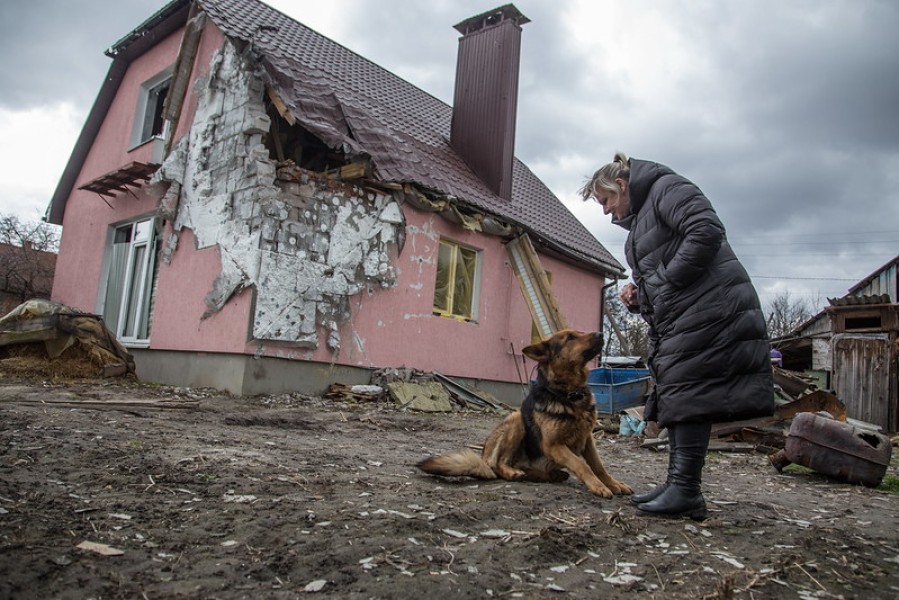Two and a half years after Russia’s full-scale invasion of Ukraine, victims continue to demand justice for the massive violations of human rights and international humanitarian law they have suffered, which have left many of them gravely harmed and psychologically traumatized. According to one victim of sexual violence, “I just want to get justice, I want everyone to be punished. It would help me recover psychologically.”
Ukrainian President Volodymyr Zelensky recently addressed the United Nations General Assembly during its annual meeting in New York, declaring that “we must hold those responsible for war crimes accountable.” His address came just two weeks after he met with International Criminal Court (ICC) Prosecutor Karim Khan to discuss the implementation of arrest warrants for Russian officials wanted for war crimes in Ukraine—and only a month after Ukraine approved a law to ratify the Rome Statute.
Since the ICC opened its investigation into alleged crimes committed in Ukraine in March 2022, the court has issued warrants for the arrest of six individuals: Russian President Vladimir Putin and Commissioner for Children’s Rights Maria Lvova-Belova for the unlawful deportation of children during the war and high-ranking military officers Viktor Sokolov, Sergey Kobylash, Sergei Shoigu, and Valery Gerasimov for directing attacks against civilians. These warrants carry important symbolic weight, signaling to the victims and the international community that the alleged crimes cannot be countenanced and will not go unaddressed.
The ICC now faces a critical challenge: how to ensure that Ukrainian victims can meaningfully participate during all stages of these cases, despite the court’s location in The Hague, far from the conflict. International criminal justice practitioners have increasingly focused on the needs of victims, recognizing that one of the goals of tribunals such as the ICC must be to reaffirm the rights and dignity of victims. By participating in criminal justice processes, victims can (re)gain a sense of agency, validation, and recognition. In the case of Sierra Leone, for example, many victims who testified at the Special Court, which was established to adjudicate serious crimes committed during the country’s civil war, reported feeling that their participation had yielded important psychosocial benefits, helping them to unburden themselves. In the words of Aminata Sesay, a victim of Sierra Leone’s civil war, “the Special Court gave us the confidence to carry on.”
The Rome Statute grants victims the right to participate in ICC proceedings. One simple yet critical way to get victims to participate is to let them know how to do so in a language that they can understand. Unfortunately, at present, some of the court’s key resources for victims are only available in English. The ICC’s webpage for Ukrainian victims informs them of their rights to send the court information about alleged crimes and to apply to be recognized as a victim for future proceedings. However, neither the online portal to submit information nor the application form to request recognition as a victim are available in Ukrainian. Since its creation in April 2022, the webpage has stated that “relevant situation-related languages will follow soon,” but it still has not happened. This is a major barrier for many victims, given that only 1 percent of Ukrainians are fluent in English, and 44 percent do not speak any English at all.
The absence of these materials in Ukrainian sends a signal to victims that the ICC is indeed a distant, foreign, and inaccessible institution. When the ICC announced its warrants against President Putin and Commissioner Lvova-Belova, many Ukrainians reacted with a mix of support and skepticism, illustrating the challenge that the court faces in earning their trust. The ICC’s Victims Participation and Reparations Section, which is responsible for informing victims of their rights to participate, can take an important first step toward building this trust by ensuring that all relevant materials are translated into Ukrainian and widely disseminated.
___________
PHOTO: A woman stands near her house damaged by military shelling in the village of Novoselivka, Chernihiv Oblast, Ukraine, in April 2022. (Oleksandr Ratushniak/UNDP Ukraine)

